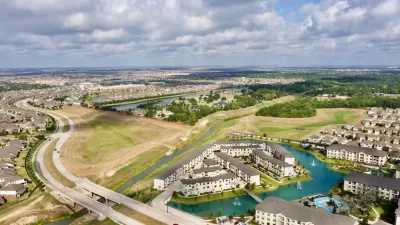While California's cities continue to be a drag on the country's job growth, cities in the Northeast and the South are doing better than average, says a new report from the Urban Institute.
Conor Dougherty discusses the findings contained in a new report released this week by the Urban Institute. "Despite a nascent real-estate recovery, cities that were hard hit by the
bust remain worst off while southern cities, buoyed by faster
population growth and industries like manufacturing and energy
exploration, remain the most insulated by the recession," writes Dougherty, summarizing the report's results. "Most of the
rest of the nation remains a hodgepodge of conflicting trends that are
emblematic of the jagged national recovery."
The reason for the wide variation in job growth can be attributed the industry composition of local job markets. For instance, according to the report, "Metros with large Education and Health
and, in some cases Government, sectors were generally resistant to the
worst negative employment effects during the recession and remain
relatively strong in the recovery. Other areas were hit harder but are
recovering well -these include metros with focal Manufacturing,
Professional and Business Services, and to a lesser extent Leisure and
Hospitality and Trade, Transport, Utilities industries."
However, "The areas of highest concern are metros
that are the 'Vulnerable' metros, which have experienced both steep
recessions and slower than average recoveries, include many metros
dominated by Retail Trade, Leisure and Hospitality, or Trade,
Transportation, and Utilities."
FULL STORY: Cities in Northeast and South Lead Recovery

Maui's Vacation Rental Debate Turns Ugly
Verbal attacks, misinformation campaigns and fistfights plague a high-stakes debate to convert thousands of vacation rentals into long-term housing.

Planetizen Federal Action Tracker
A weekly monitor of how Trump’s orders and actions are impacting planners and planning in America.

In Urban Planning, AI Prompting Could be the New Design Thinking
Creativity has long been key to great urban design. What if we see AI as our new creative partner?

King County Supportive Housing Program Offers Hope for Unhoused Residents
The county is taking a ‘Housing First’ approach that prioritizes getting people into housing, then offering wraparound supportive services.

Researchers Use AI to Get Clearer Picture of US Housing
Analysts are using artificial intelligence to supercharge their research by allowing them to comb through data faster. Though these AI tools can be error prone, they save time and housing researchers are optimistic about the future.

Making Shared Micromobility More Inclusive
Cities and shared mobility system operators can do more to include people with disabilities in planning and operations, per a new report.
Urban Design for Planners 1: Software Tools
This six-course series explores essential urban design concepts using open source software and equips planners with the tools they need to participate fully in the urban design process.
Planning for Universal Design
Learn the tools for implementing Universal Design in planning regulations.
planning NEXT
Appalachian Highlands Housing Partners
Mpact (founded as Rail~Volution)
City of Camden Redevelopment Agency
City of Astoria
City of Portland
City of Laramie





























